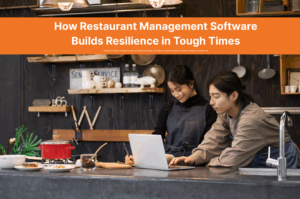Updated on: April 22, 2023
Sustainability is a major concern in every industry, and the restaurants are no exception. From embracing energy-efficient equipment to eliminating non-biodegradable packaging, the food service sector has come a long way in decreasing their environmental impact. New advances in technology now make it even more convenient to practice earth-friendly business, with programs offering everything from inventory management to employee training programs.
Want help getting started? Here are three simple ways to use restaurant technology to improve sustainability.
Go Digital
Want to go green? Go paperless. Paper waste is a significant contributor to global deforestation, and traditional restaurants go through a lot of paper. From menus to receipts and order tickets, even a small restaurant can produce a significant amount of paper waste. And due to the materials used for receipt paper and potential contact with food sources, most of that paper cannot be recycled.
Fortunately, point-of-sale technology now provides handheld devices for servers to eliminate order tickets (and prevent miscommunications between servers and kitchen staff,) and customer-facing POS programs eliminate traditional menus as customers order via kiosks, table-based smart devices, online, or via an app.
Reduce Waste
Another major restaurant concern? Food waste. Research studying commercial food management suggest that up to 83% of unused restaurant food is wasted, costing serious damage to both the environment and profit margins. But proactive restaurant technology can improve both sustainability and restaurant profitability.
Consider investing in restaurant purchasing software and inventory management solutions that help track inventory, make suggested order requests, and keep kitchen staff informed regarding which menu items are likely to sell better than others. Not only will you reduce food waste and costs, you’ll reduce the carbon footprint of your business by reducing potentially unnecessary deliveries. Long-term, better food purchasing practices can also increase sustainable farming practices as well as farmers react to accurate supply and demand requests from restaurants and grocery stores.
Employee Training
Lastly, you’ll need to engage your staff in order to fully embrace long-term sustainability. This means providing continuous training and education on best practices regarding recycling, food safety, and energy use. Syncing your front and back of house technology with an operations program can help staff members maintain an eco-friendly work environment through the creation of daily tasks lists, routine procedures to eliminate food and energy waste, and cleaning and food-management protocols to keep your business HACCP compliant. Not only will you improve the customer experience, you’ll help foster a company-wide commitment to environmentally friendly service.
According to recent statistics from The Nielsen Company, 66% of customers are willing to pay more for sustainable products and services. That number jumps to 74% for millennial customers eager to support energy responsible business practices.
And though there is some initial cost associated with purchasing new technology, ReFED (Rethink Food Waste Through Economics and Data) reports that every dollar invested in eliminating food waste saves businesses up to $8 in return. So aside from reducing greenhouse emissions and improving overall environmental health, technology-based sustainability is the most fiscally responsible approach to restaurant development and success.






